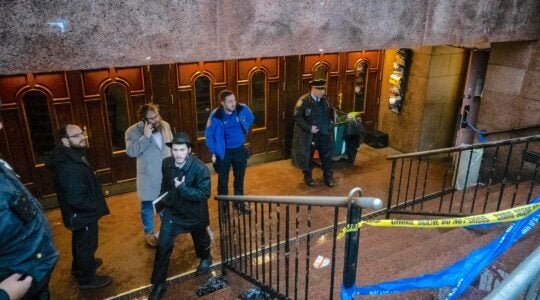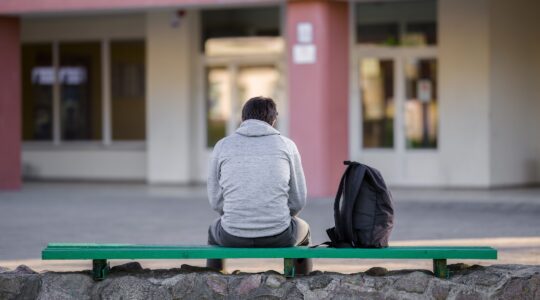Perhaps no one since Adolph Eichmann has been charged with complicity in more Jewish murders than Sami Al-Arian, the Florida professor affiliated with Islamic Jihad.
The difference between Eichmann and Al-Arian is that in 1962, the year the Nazi was hanged for his crimes against humanity, the American public and the Jewish public cared. In 2005, with the lack of media coverage, maybe they werenít given an opportunity to care.Al-Arian was acquitted last week on eight counts, including conspiring to murder, with the jury unable to reach a verdict on nine additional counts.
His case was in the shadows on American TV except for the trialís opening and closing six months apart.By contrast, despite taking place in Israel, the Eichmann trial with its many witnesses presenting gruesome testimony, was given numerous hours of coverage, highly rare in those pre-cable days, leading to passionate discussions in living rooms and synagogues.
Al-Arianís story was covered over the years. In November 1994, a PBS documentary showed Al-Arian as the leader of Islamic Jihadís American support network. In May 1995, the Tampa Tribune published a series linking Al-Arianís use of an academic front to shield fundraising and organizational support for Islamic Jihad.
The Tribune, more than any paper, held on to this story like a dog to a bone, with more than 700 stories in the past decade, according to one count. Go to The New York Times online and search over that same time period for stories including Al-Arian; there were 30.
But aside from the Florida papers, Al-Arianís trial was greeted with a dull thud. On the liberal news and opinion Web site HuffingtonPost (Dec. 7), Eric Boehlert pointed out that when then-Attorney General John Ashcroft announced the indictment in February 2003, the press conference was carried live on CNN. ABC led that nightís newscast with the Al-Arian arrest. NBC and CBS also gave the story prominent play that evening.ì
But last night,î Boehlert wrote, ìin the wake of Al-Arianís acquittal, it was a different story. Neither ABC, CBS nor NBC led with the terror case on their evening newscasts. … In fact, according to TVEyes, the 24-hour monitor system, none of the networks reported the acquittal at all.îAl-Arianís acquittal now ranks alongside the O.J.-like acquittals of Lemrick Nelson for the murder of Yankel Rosenbaum in the Crown Heights riot, and El-Sayid Nossair for the murder of Meir Kahane in 1990 in the annals of curious jurisprudence when it comes to dead Jews. But unlike the Nelson and Nossair juries that had no Jews on them, no Northern paper picked up on the extraordinary revelation in the St. Petersburg Times (Dec. 12) that one of the Al-Arian jurors, Joann Thanh (last name withheld), is an Orthodox Jew, a child of a Vietnamese mother and an American soldier who converted to Judaism when she married.
During the half-year trial, despite jurors sharing all sorts of personal stories, the St. Petersburg Times reported that Thanh ìnever mentioned her home life, fearing other jurors might think it would make her biased.î In fact, Thanh was one of only five jurors voting for acquittal on all counts.Like Eichmann, Al-Arian wasnít accused of pulling a trigger but of pulling the levers that kept the death machine running. If circumstantial evidence means anything, his circumstances were a beaut: At a politically radical University of South Florida think tank, Al-Arian hired his faculty partner Ramadan Salah, now living in Syria as the undisputed top man of Palestinian Islamic Jihad.
If the trial was heralded by the Justice Department as the showcase for the Patriot Act, and now a showcase for administration failure, it is also to some extent an Israeli failure.
On the eve of the trial, Haaretz (May 18-19) reported that some 100 Israelis were on the prosecutionís witness list, and Israelís Justice Ministry sent dozens of boxes of documents for the prosecutionís use along with hundreds of hours of phone calls tapped by Israeli intelligence. According to Haaretz, ìIsrael owns much of the copyright for the case; a well-informed source termed the prosecution an ëAmerican-Israeli co-production.í
According to The Tampa Tribune (Dec. 11), the trial was big news in the Arab world. Al-Jazeera announced the verdict immediately and aired a half-hour program on the deficiency of the Patriot Act. Al-Arabiya TV, based in the United Arab Emirates, covered the trial from the beginning.ìIt was definitely big news on every [Arab] network,î said Al-Arabiyaís Washington bureau chief, Nadia Bilbassy. [Al-Arian] is a well-known professor and advocate for Palestinian causes.î
The Tribune noted that Israeli newspapers downplayed the verdict: ìThere were no blaring headlines or visceral editorials.îThe New York Sun (Dec. 7) in an editorial wrote, ìThe charges against Mr. Al-Arian on which the jury failed to decide are major, including terror-related fraud and conspiracy charges. Americans deserve to have these charges decided by a jury one way or another.îIn the St. Petersburg Times (Dec. 8), columnist Howard Troxler said ìthe mere fact that the jury was hung on several charges shows that the government had a strong enough case to convince at least some of the jurors. The feds were, at least, inside the ballpark.î
Debbie Schlussel, a legal commentator and columnist, wrote in FrontPage (Dec. 9), that the verdict ìwas a sad day in America, but not one that was unexpected.î She had predicted Al-Arian would walk.
ìOne need only look at the Justice Department record of fighting terrorism in court. Itís a complete failure,î Schlussel wrote. ìItís not just this case, blown big time Ö but a host of other high-profile cases that were either flat-out lost or botched beyond belief.îSchlussel pointed out that the prosecution could and should have taken one month instead of the five months, ìin which they threw in every piece of evidence no matter how weak, causing jurorsí eyes to repeatedly glaze over. A Tampa TV reporter I know told me that he and other reporters were so bored, they stayed awake by betting on which juror would fall asleep next.î
Supporting that, Eric Lichtblau, who covered the case for The New York Times, e-mailed us early in the proceedings that the prosecutionís case opened with immigration procedures so boring that it had ìseveral jurors (and lawyers) nodding off.îThe St. Petersburg Times reported that when the prosecution wasnít somnambulant, it was stumbling. Al-Arianís defense was that he was raising money for Islamic Jihad charities but was not part of its murderous wing. The government called a Palestinian legislator as a witness against Al-Arianís claim, only to have the Palestinian, Ziad Abu-Amr, testify that Islamic Jihad does support summer camps, kindergartens, child care and health services.Another government witness, former college professor Abdul Raouf Dabus, also testified repeatedly that he only knew of Al-Arian raising money for charitable purposes.
The New York Jewish Week brings you the stories behind the headlines, keeping you connected to Jewish life in New York. Help sustain the reporting you trust by donating today.




